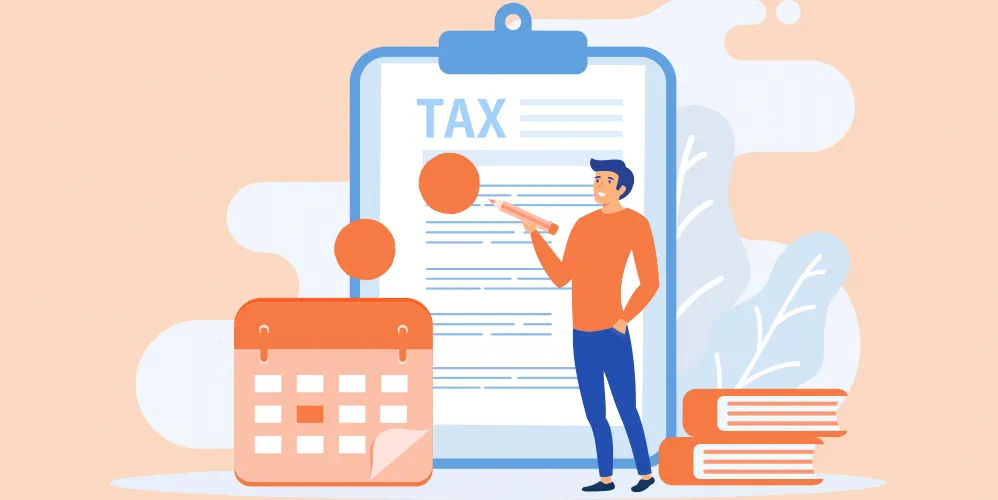
Tax Benefits Under NPS One Can Avail of
03 जुलाई 2019

National Pension Scheme or NPS is a central government scheme for all those who want to save for their retirement days early on. So if your retirement is still some time to go and you are already planning to make arrangement for your golden days, the NPS is your ticket to achieving these goals. There are several benefits of the NPS scheme as it is a low risk scheme. The tax benefits that come with the NPS make it a great choice of investment. Here are some of the NPS tax benefits:
NPS tax benefit for individuals:
Any person subscribing to the NPS is eligible for a tax deduction of 10 % of his/ her gross income up to Rs1.5lakh under the section 80 CCD (1) of the Income Tax Act. In an exclusive tax saving benefit, you are also eligible for an additional deduction for investment up to Rs50,000 in NPS (Tier I account) under subsection 80CCD (1B). This exclusive benefit is over and above the deduction of up to Rs 1.5 lakh under section 80C. NPS tax benefits for individuals under corporate sector
You are eligible for an additional tax benefit if you have subscribed to NPS scheme under the corporate sector. This deduction is under the section 80CCD (2). Under this the employer’s NPS contribution up to 10% of salary (Basic + DA) is deductible from taxable income, without any monetary limit.
NPS tax benefits for corporates
Corporates making contribution towards employee’s NPS is deducted as business expense from their profit and loss account. So the employer’s contribution towards NPS up to 10% of salary (Basic + DA) can be deducted as NPS tax exemption.
NPS tax benefits on partial withdrawal
National pension scheme tax benefits is that you can partially withdraw funds from your NPS tier-I account .This benefit is available for specified purposes only. The amount withdrawn up to 25% of your contribution is exempt from tax.
NPS tax benefit on annuity purchase
If you invest funds in annuity, it is completely exempt from tax. Only the income from annuity received in the subsequent years is taxable.
NPS tax benefit on lump sum withdrawal
When you are 60 years old, if you withdraw the funds in lumpsum, maximum 60% of the corpus can be withdrawn from which 40% of the corpus is exempted from tax.
One of the biggest selling points for NPS is the additional tax benefits attached to the scheme. If you have a low appetite for risk and want to plan for your retirement days, invest in an NPS now. Click here to invest in an NPS tax saving scheme.
Popular Articles
Related Articles










-
डिस्क्लेमर
इस लेख/इन्फोग्राफिक/चित्र/वीडियो की सामग्री का उद्देश्य केवल सूचना से है और जरूरी नहीं कि यह बैंक ऑफ बड़ौदा के विचारों को प्रतिबिंबित करे। सामग्री प्रकृति में सामान्य हैं और यह केवल सूचना मात्र है। यह आपकी विशेष परिस्थितियों में विशिष्ट सलाह का विकल्प नहीं होगा । बैंक ऑफ बड़ौदा और/या इसके सहयोगी और इसकी सहायक कंपनियां सटीकता के संबंध में कोई प्रतिनिधित्व नहीं करती हैं; यहां निहित या अन्यथा प्रदान की गई किसी भी जानकारी की पूर्णता या विश्वसनीयता और इसके द्वारा उसी के संबंध में किसी भी दायित्व को अस्वीकार करें। जानकारी अद्यतन, पूर्णता, संशोधन, सत्यापन और संशोधन के अधीन है और यह भौतिक रूप से बदल सकती है। इसकी सूचना किसी भी क्षेत्राधिकार में किसी भी व्यक्ति द्वारा वितरण या उपयोग के लिए अभिप्रेत नहीं है, जहां ऐसा वितरण या उपयोग कानून या विनियमन के विपरीत होगा या बैंक ऑफ बड़ौदा या उसके सहयोगियों को किसी भी लाइसेंसिंग या पंजीकरण आवश्यकताओं के अधीन करेगा । उल्लिखित सामग्री और सूचना के आधार पर किसी भी वित्तीय निर्णय लेने के लिए पाठक द्वारा किए गए किसी भी प्रत्यक्ष/अप्रत्यक्ष नुकसान या देयता के लिए बैंक ऑफ बड़ौदा जिम्मेदार नहीं होगा । कोई भी वित्तीय निर्णय लेने से पहले अपने वित्तीय सलाहकार से सलाह जरूर लें।
Reasons Why You Need To Have a Fixed Deposit
Since the generation of our fathers and grandfathers, fixed deposits remained a preferred instrument to put our hard earned savings in. We would put away a lump sum in a fixed deposit offering an attractive and steady interest rate. Why we preferred and continue to prefer fixed deposits is because of the fixed interest rate which does not go up and down with changes in lending rates. FDs were considered safe and they gave us stable returns. Now you can even open an FD online without even having to go to the bank.
FDs are good for people who have extra lumpsum, which they don't need to use at the time.
FDs ensure capital protection and uniform flow of income. If you are risk-averse and do not want equity exposure, FD is for you
A Fixed Deposits is a saving instrument where you put a lump sum amount for a fixed period of time and earn a fixed rate of interest. On maturity you earn the principal invested along with the interest, which you can always reinvest! They are also called term deposits because you park money in them for a given tenure. Here are the key features of a Fixed Deposit:
Fixed rate of interest
Fixed deposits come with a fixed rate of interest when you open one. The rates of interest themselves keep getting revised from time to time, based on key lending rates. But you only get the rate of interest you locked into while booking the fixed deposit. Bank of Baroda, one among the oldest and largest banks of India, offers one of the highest deposit rates in the country, and has been a preferred bank to open FDs with, for many years now, given its security, pedigree and attractive rate of interest.
It is secure
Unlike financial instruments that depend on market movements, which are volatile, for you to profit from, fixed deposits are secure instruments since they give steady returns. For example, if the interest rates were to fall, you will still earn the rate of interest you were promised while booking the FD.
A bank’s market value, legacy and history also give it immense credibility and a sense of security to the depositors like the millions of depositors of Bank of Baroda who have parked their hard earned income and salaries in the Bank of Baroda deposit schemes for over a century now.
Return on investment
How much your returns on investment are on an FD will really depend on the interest rate and tenure of the FD you choose. You are likely to get more from investing in a long term FD but short term FD will give you more liquidity, depending on whether if your financial requirement is more immediate. You can also pick various options in FDs where you can either reinvest the proceeds you get from an FD or you can request for pay outs on a quarterly or monthly basis. In both the cases, the returns will vary
Flexible Tenures
Bank of Baroda offers flexible tenures. It offers both short term and long term FDs for the benefit of the depositors.
Lending facility against FDs
Some banks also offer loans against FDs, so you do not have to break or liquidate your FD before maturity to get cash. Also, you can continue to earn the interest on the FDs. These loans are in the form of an overdraft (OD).
What is Forex Card?
Planning to go on a trip abroad? Don’t forget to carry a forex card for a hassle-free trip. So, what is forex card?
A forex card is the safest way of carrying foreign currency for paying for expenses when you are travelling abroad. It is a prepaid card which you can load with a specified amount in a foreign currency. So, when you are travelling overseas, you can swipe this forex card to pay for your expenses, instead of carrying cash around. It works as a debit card. You can also withdraw cash with your forex card from an ATM.
What is forex card and its types?
A forex card is a type of prepaid card in which you can load money in foreign currency. It is globally accepted, and you can either pay for your expenses using your forex card or withdraw cash in foreign currency at an ATM.
Forex cards are largely divided into two types – single currency cards and multicurrency cards.
Single currency forex card: A single currency forex card can be loaded with a particular foreign currency. You can use load this card with a currency when travelling to a particular country.
Multi-currency forex card: As the name suggests, you can preload this card with multiple currencies. Check with your bank about the currencies that you can load onto your multi-currency forex card.
What is the use of forex card?
A forex card is your best friend when you are travelling in a foreign country. There are several benefits of carrying a forex card over travelling with wads of cash or looking for places to convert currencies.
With a forex card, you are likely to get a better conversion rate. Buying a forex card from a bank is a cheaper solution to currency converted.
Most banks offer a range of forex cards that can suit your needs. You need not necessarily have an existing account with the bank to be able to purchase a forex card.
You can avail of many deals, offers and discounts that most banks offer when you purchase a forex card.
A forex card is much safer than carrying cash around. It comes with the chip and pin technology, which adds another layer of safety. Further, if you lose your forex card, you can get your card hot listed immediately to avoid any misuse of the card.
If your card has a remaining balance when you are back home from travel, you can encash the amount at the existing exchange rates. To avoid maintenance charges, you can get your card blocked until your next visit overseas.
How forex cards work?
What is forex card if not a debit/ credit card for your overseas travels. They are globally accepted and are a safer alternative to cash. But how does a forex card work?
It works exactly like a credit or debit card. You apply for a card. Once your application is approved, you receive the card with a pin. Change the pin. Use internet banking to load the card with your desired amount and currency. Now you are good to go.
When abroad, just swipe your forex card at the point of sale machine whenever you pay for something. Just like a debit/ credit card transaction, you will receive SMS and email notification of your transaction and the balance.
Gone are the days of travelling with cash in hand. The world has gone digital and it’s time you did, too. With a forex card in hand, you can get the best deals. Be a global citizen and shop without any limits with a forex card. Avoid queues for exchanging your currencies. Forget about the hassles of travelling with wads of cash in your pocket. Just swipe your forex card and enjoy your trip to the fullest.

